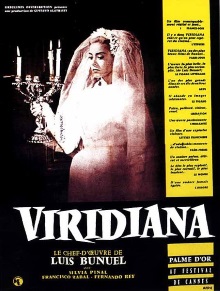
This marks the third film we’ve watched by Luis Buñuel, all within a year. This is because I’d asked for recommendations of South American films from a Broken Forum poster and he must really like Buñuel. We’re still slowly working through the list. To be honest, I was hoping that this would be one of his more surreal films like The Exterminating Angel, but it turned out to be a more direct social commentary film like Los Olvidados, albeit in the completely opposite direction.
The titular Viridiana is an orphan who has been raised in a convent. On the verge of taking her vows as a nun, she is persuaded by her Mother Superior to pay a visit to her wealthy uncle. This leads to an awkward but predictable situation in which he falls in love with her and tries to get her to marry him. It would be too much of a spoiler to say exactly what happens next, but eventually the film revolves around her trying to set up a shelter for the beggars of the town while the uncle’s illegitimate son works to restore the prosperity of his father’s estates.
Even early on there are hints that this film presents a less than flattering view of religion. Viridiana is reluctant to visit her uncle as she claims not to know him well and is eager to quickly take her vows and settle down in the convent permanently. Yet her Mother Superior pressures her to not only visit him but to show him some affection, seemingly because he pays the convent for her upkeep. This view is further cemented when the Mother Superior visits Viridiana herself and appears eager to obtain a share of the uncle’s properties.
Reading up on this film’s history, the Vatican called it blasphemous and one specific scene that parodies Da Vinci’s The Last Supper makes it obvious that this is justified. As I stated, this surprised me since the critique here is directed against the beggars and Viridiana’s naive expectations of them. The poor and dispossessed are portrayed as useless and even uncivilized parasites who take advantage of Viridiana’s kindliness. They are petty and cruel even to their own, though they are crafty enough to hide their worst behaviors from their betters. This temperament is contrasted against that of Don Jaime’s son. He is not a nice man and seems to have the habit of just reaching out and taking whatever it is he wants. But the film presents him as a doer and a productive member of society. It is telling that their servants who though poor do work industriously, respects him more than they do Viridiana. It’s a far cry indeed from the sympathetic view of the downtrodden shown in the previous film.
As novel as this is since you rarely see a social stance like this nowadays outside of Republican ranting in the US, I found to be too blunt to be truly interesting. The montage that intercuts scenes of Viridiana leading the beggars in prayer while the son directs the rebuilding of his father’s estate has all of the subtlety of a cudgel. My wife liked the Last Supper scene but for my part while I can appreciate how much shock value it must have had back in the day, it’s so common today that it doesn’t hold much power to me and I could see it coming from a mile away. Both of us do agree that the first half of the film about her relationship with her uncle feels like it’s too long without enough of a pay off when all that Buñuel really wants to say is in the second half.
Still the black and white images are beautiful, Silvia Pinal as the lead actress is simply gorgeous, and blunt though its messaging is, there’s a wicked sort of delight in it. For all of these reasons, Viridiana remains an engaging film to watch, though in my opinion not an especially noteworthy one.